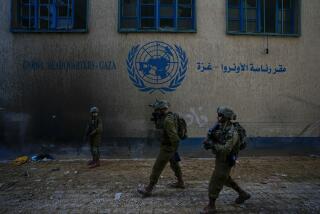National Security Agency Offers Veiled Tour of Top-Secret Operations
- Share via
FORT MEADE, Md. — The super-secret National Security Agency, which eavesdrops on communication worldwide as part of U.S. spying operations, opened its doors Saturday to offer outsiders a rare glimpse of facilities that test antennas and print nuclear code books.
About 16,500 employees and their families were expected at the first “family day” since 1996 held at NSA headquarters, about 25 miles outside Washington, as the spy agency makes a greater effort to inform Americans about its mission.
“American people need an image of this agency so its identity is not a vacuum,” NSA Director Lt. Gen. Michael Hayden told reporters.
There was the “anechoic chamber,” which looked like a science-fiction movie set, with blue foam spikes of different sizes poking out of the floor, walls and ceiling of the 42-foot-high room.
It is echo-free and one of five rooms at NSA for testing antennas used to collect information. The antenna revolves on a high pedestal at one end, while information is transmitted from the other end of the room.
The Air Force has a similar room big enough to test an entire airplane, an NSA official said.
“Each cone is sized to absorb a different frequency,” said the official, who spoke on condition of anonymity.
Areas opened to visitors were sanitized to ensure no classified material was lying around.
A 66,000-square-foot printing plant produces code books--160 million pages a year--used in U.S. military operations.
Nuclear code books for use in the event the United States orders a nuclear strike are produced about four times a month, compared with nearly every day during the 1991 Persian Gulf War.
The book is in a sealed plastic pouch that has a unique pattern of pink splotches and is puffy because of air inside.
If there is any change in the package, such as the amount of air inside or the design of the splotches, which is videotaped before being sent out, the codes are considered compromised.
“We’ll go back and see if the splatter diagram is the same. We’ve got a video of the package,” said Dan Shirko, chief of publishing.
The nuclear code books are in the hands of nearly 1,000 people, mostly military officers, such as pilots and sailors on submarines and battleships.
Also displayed was security equipment that identifies a user by the iris, face, fingerprint and voice. NSA produced the equipment with private industry partners.
Once the computer recognizes the user by one of those methods, it allows access.
“The face system actually distinguishes between twins,” said Dave Murley, technical director of identification and authentication research.
The iris recognition, which scans the front of the eyeball, was the most accurate of the four methods and voice recognition the least accurate, he said.
Reminders of the need for security were all around. In the cafeteria, one sign read, “Don’t spill the beans pardner, the steaks are too high. No classified talk.”
More to Read
Sign up for Essential California
The most important California stories and recommendations in your inbox every morning.
You may occasionally receive promotional content from the Los Angeles Times.











